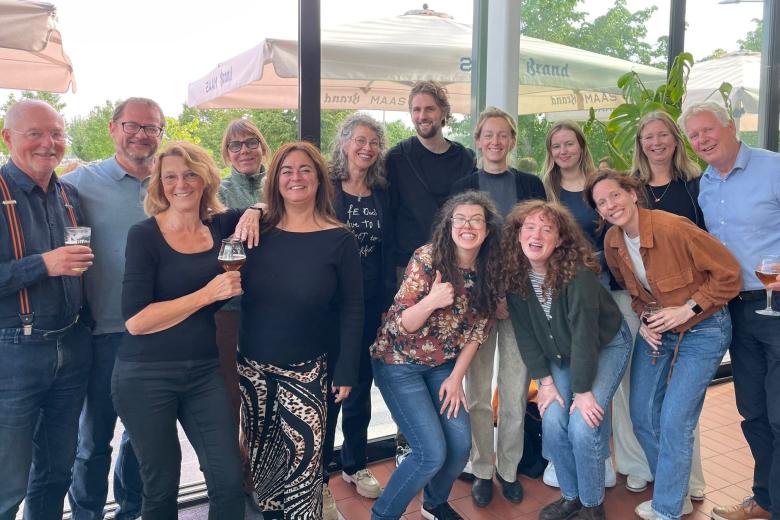FPN's 300ste PhD'er: Rachana Desai
Op 23 oktober verdedigt Rachana Desai haar PhD-thesis. Daarmee is zij de 300ste PhD van FPN. Desai verdeelde haar tijd tussen Kaapstad en Maastricht om onderzoek te doen naar schoolverlatende jeugd. Waarom verlaten zij school en welke (sociale) factoren spelen hierbij een belangrijke rol?
De rest van dit artikel is alleen beschikbaar in het Engels.
Cape Town to Maastricht
After completing her psychology training at University of the Witwatersrand in Johannesburg, South Africa, she started working at the Human Sciences Research Council (HSRC) in Cape Town where there was a lot of unused research data on out-of-school youth. With the help of her colleague and supervisor she secured a PhD position in which she could divide her time between Maastricht and Cape Town. So, she herself managed to receive a grant to come to Maastricht University to obtain her PhD and put the unused data to good use.
“Then it hit me… Now I need to come to Maastricht. I had never traveled to Europe, and it changed my life”
Outside of the academic benefits, Desai took the opportunity to broaden her vision on the world and her place in it. “What can I bring to the table, as a representative of South Africa”?
The project
The PhD project focused on South African out-of-school youth (also known as school dropouts) between the ages of 13-20. Why did they drop out? And what role does their social environment play on their, alcohol and tobacco use? “It was quite a difficult group to locate, in South Africa, once you drop out of school, you are kind of lost in the system”.
Knowing how and where to look
“We had to come up with an innovative way of finding our subjects”. Desai received a list of dropouts from randomly selected schools in 4 different provinces. These people formed the first sample frame (or the seed). They were then asked to contact 3 more dropouts they knew, and those people were asked to contact another 3 dropouts, and so on. “In the end we got 4432 participants. I thought that was pretty cool!”.
“We combined all our new data with existing data from the HSRC to create a comprehensive study of the target group”.
Qualitative data
The surveys were a good start, but Desai also needed qualitative data in the form of individual interviews. “I did one-on-one interviews do dig deeper into their reasons for leaving school. And to really see how your social environment plays a role in your behaviour”.
The results were satisfying, surprising, and sometimes not surprising. Teenage pregnancy and financial difficulties are the most prevalent reasons for leaving school. There are also gender differences. Males tend to leave school due to the school-related factors, such as: bullying, poor performance, or bad relationships with their peers and teachers. Females will more likely leave school because of caretaking responsibilities.
Surprising was how strong the influence is of the extended family and the family of friends. “A lot of people that I interviewed, did not actually live with their parents, but with their extended family”. Surprisingly the friend’s family played both a positive and negative role in their alcohol and tobacco “The people around you can set a good or bad example. They can allow you to smoke and drink or take on a more traditional parenting role”.
Data collection as an outsider
“I targeted quite dangerous areas in South Africa, communities with a lot of crime and violence”. In order for Desai to reach some of the communities, she had to enlist locals to work for her. Even though she’s South African, in these communities she would be regarded as an outsider. Which would hinder the data collections considerably. “As an unfamiliar face, you immediately become a target”.
Desai trained locals who spoke English, Afrikaans and Xhosa to do qualitative interviews and translate and transcribe them. “Finding reliable and qualified staff was a real challenge. Some people just want to make money fast, so I had to teach them about the necessity of qualitative research. This was a back and forth process between training, going into the field, and improving”. Desai also had to carefully monitor that the results were not fabricated or duplicated.
Next up
Desai has received funding to start her Post Doc at the University of the Witwatersrand in Johannesburg. Her work there will be an extension of her PhD project, based on digital storytelling among out-of-school youth. “I noticed that my participants felt very relieved just to share their story. It allowed them to reflect and see the bigger picture”. So, this project will allow these people to tell their story via a short media production. “It creates a counselling and support system for out-of-school youth, giving them the tools to deal with the problems they have just shared”.
Desai is looking for master’s students who would like to come over to South Africa as interns. If you are interested, send an email to: rachana.desai.rd@gmail.com.
Lees ook
-
Meest prestigieuze Europese beurs voor twee UM-wetenschappers
Twee hoogleraren van Universiteit Maastricht krijgen de meest prestigieuze Europese onderzoeksbeurs voor individuele onderzoekers: een ERC Advanced Grant, ter waarde van ruim €2,5 miljoen. Het gaat om Lorenzo Moroni (MERLN) en Alexander Sack (FPN).

-
CIAO verlengt samenwerking met UWV voor 4 jaar
Het Centrum Inclusieve Arbeidsorganisatie (CIAO), onder de Faculty of Psychology and Neuroscience van de Universiteit Maastricht vlag, heeft de succesvolle samenwerking met het UWV (Uitvoeringsinstituut Werknemersverzekeringen) voor 4 jaar verlengd. Wij spraken met Gemma van Ruitenbeek en Nicole...

-
Europese samenwerking om de langetermijneffecten van COVID-19 op cognitie in kaart te brengen
De COVID-pandemie ligt achter ons en hoewel de meeste mensen verder zijn gegaan, of dat in ieder geval hebben geprobeerd, zijn we nog steeds niet zeker van de gevolgen op de lange termijn. Professor Alexander Sack van de Faculty of Psychology and Neuroscience heeft zich aangesloten bij drie andere...
